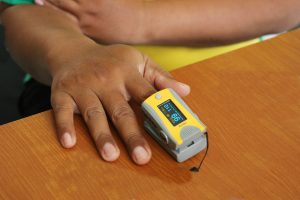The FDA is assembling a panel of experts to evaluate industry-wide claims that pulse oximeters have the potential to render inaccurate readings when used on patients with dark skin. The panel will convene on the first day of November 2022 to inspect the meters, which are typically placed on the finger of a patient and use light to gauge blood oxygen and pulse levels. In a statement regarding the upcoming meeting, the FDA said that the specialized panel will “discuss ongoing concerns that the pulse oximeters may be less accurate in individuals with darker skin pigmentations.”
The concerning issue was first brought to wide-scale public attention in late 2020, when a letter submitted to the New England Journal of Medicine relayed the results of a study conducted by physicians at the University of Michigan Medical School. That study found that a large number of Black patients who had seen normal pulse oximeter readings with healthy blood oxygen levels in fact had alarmingly low amounts of oxygen in their blood. This discrepancy occurred when they were tested with oxygen saturation, which means arterial blood was drawn concurrently.
“In two large cohorts, Black patients had nearly three times the frequency of occult hypoxemia that was not detected by pulse oximetry as White patients,” the study’s authors wrote. “Given the widespread use of pulse oximetry for medical decision making, these findings have some major implications, especially during the current coronavirus disease 2019 (COVID-19) pandemic. Our results suggest that reliance on pulse oximetry to triage patients and adjust supplemental oxygen levels may place Black patients at increased risk for hypoxemia.”
The FDA had issued a warning in 2021 for patients using OTC oximeters for monitoring conditions like COVID-19, advocating increased attention to signs and symptoms rather than relying on diagnostic device readouts.























